Thesolitaryreaper详细赏析.ppt
the sollitary reaper
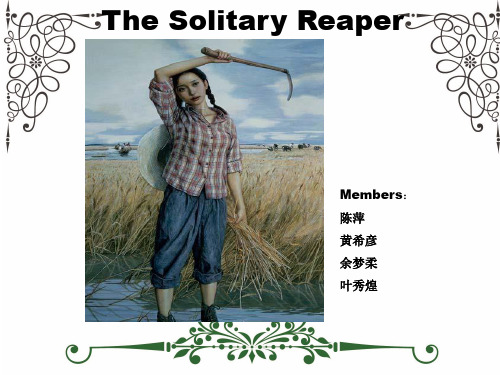
Stanza 1 Behold her, single in the field,
看,那个女孩儿 ,一个人在田 里, Yon solitary highland lass! 这孤高的高原女孩! Reaping and singing by herself; 独自割麦,独自在唱歌! Stop here, or gently pass! 为她止步,或者悄悄走过! Alone she cuts and binds the grain 她独自把麦子割了又捆, And sings a melancholy strain; 唱出无限悲凉的歌声, O listen! for the vale profound 屏息听吧!深广的谷地 Is overflowing with the sound. 已被歌声涨满而漫溢!
Long after it was heard no more.The solitary reaper’s song left an unforgetable impression on the poet’s mind.
sickle 英国农村常 用的大割镰
And o'er the sickle bending;—— I
A voice so thrilling ne’er was heard In spring-time from the Cuckoo-bird, Breaking the silence of the seas Among the farthest Hebrides. Notes:
Thrilling: the song that the girl sang made the poet feel moved Ne’er=never Cuckoo –bird: a kind of bird whose sound makes people feel sad Hebrides: a group of more than 500 islands off the western coast of Scotland, which have taught centuries of artists, scientists, poets, and travelers to treasure the wild
诗歌《我如行云独自流》英文分析

Influence
the leading figure of the English romantic poetry. contribution: he has not only started the modern poetry, the poetry of the growing inner self, but also changed the course of English poetry by using ordinary speech of the language and by advocating a return to nature.
波光里的涟漪也舞弄清影,却 怎比得水仙的欢快; 伴有这等喜悦, 诗人如何不快! 我——久久凝视——但毫无答复,
A poet could not but be gay,
In such a jocund company:
I gazed---and gazed---but little thought
What wealth the show to me had brought. 可知这景致给予我多少财富:
Lake poets
Wordsworth, Coleridge and Southey were known as Lake Poets because they lived and knew one another in the last few years of the 18th century in the district of the great lakes in Northwestern England. The former two published The Lyrical Ballads together in 1798, while all three of them had radical inclinations in their youth but later turned conservative and received pensions and poet laureateships from the aristocracy.
The Solitary Reaper华兹华斯个人分析
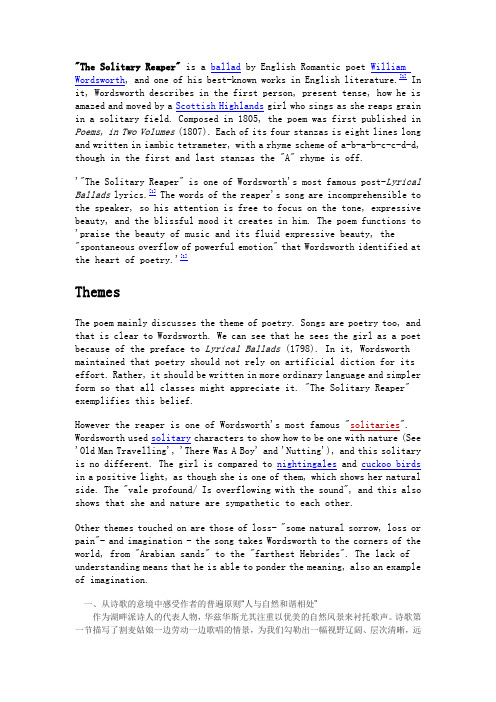
"The Solitary Reaper" is a ballad by English Romantic poet William Wordsworth, and one of his best-known works in English literature.[1] In it, Wordsworth describes in the first person, present tense, how he is amazed and moved by a Scottish Highlands girl who sings as she reaps grain in a solitary field. Composed in 1805, the poem was first published in Poems, in Two Volumes(1807). Each of its four stanzas is eight lines long and written in iambic tetrameter, with a rhyme scheme of a-b-a-b-c-c-d-d, though in the first and last stanzas the "A" rhyme is off.'"The Solitary Reaper" is one of Wordsworth's most famous post-Lyrical Ballads lyrics.[1] The words of the reaper's song are incomprehensible to the speaker, so his attention is free to focus on the tone, expressive beauty, and the blissful mood it creates in him. The poem functions to 'praise the beauty of music and its fluid expressive beauty, the "spontaneous overflow of powerful emotion" that Wordsworth identified at the heart of poetry.'[1]ThemesThe poem mainly discusses the theme of poetry. Songs are poetry too, and that is clear to Wordsworth. We can see that he sees the girl as a poet because of the preface to Lyrical Ballads (1798). In it, Wordsworth maintained that poetry should not rely on artificial diction for its effort. Rather, it should be written in more ordinary language and simpler form so that all classes might appreciate it. "The Solitary Reaper" exemplifies this belief.However the reaper is one of Wordsworth's most famous "solitaries". Wordsworth used solitary characters to show how to be one with nature (See 'Old Man Travelling', 'There Was A Boy' and 'Nutting'), and this solitary is no different. The girl is compared to nightingales and cuckoo birds in a positive light, as though she is one of them, which shows her natural side. The "vale profound/ Is overflowing with the sound", and this also shows that she and nature are sympathetic to each other.Other themes touched on are those of loss- "some natural sorrow, loss or pain"- and imagination - the song takes Wordsworth to the corners of the world, from "Arabian sands" to the "farthest Hebrides". The lack of understanding means that he is able to ponder the meaning, also an example of imagination.一、从诗歌的意境中感受作者的普遍原则“人与自然和谐相处”作为湖畔派诗人的代表人物,华兹华斯尤其注重以优美的自然风景来衬托歌声。
孤独的割麦女赏析

Of Beauty with The Solitary Reaper (review)There is an old saying "beauty is eternal".It's the experience of our forefathers,however, time tries truth, it is correct in many cases even today,especially in William Wordsworth's poem:The Solitary Reaper. Why can the classic poem cater even to modernist`s aesthetic? As far as I am concerned,the reasons can be listed as follows:First of all,in the poem, loneliness is beautiful. In the first stanza,Wordsworth used varying words to sets the lonely atmosphere,such as "single," "melancholy," "solitary," and "by herself". Less is more, and I believe that in any cases,hubbub and buzz are anything but beauty. So is the reason that The Thinker has astonishing beauty.Secondly,in the poem, imagination is beautiful. Without imagination Wordsworth can never write such romantic and moving words. He imagined that the girl's voice is more beautiful than nightingale and cuckoo-bird,which are the beacon light to illuminate people's way forward with great inspiration. Furthermore, we have no idea of how was the girl and what kind of songs the girl was singing after finishing reading it. My view is the poet did it on purpose. Because we can exert our imagination to draw the picture in our minds as beautiful as we can. By the w ay,to be imaginative, we need to be more sensitive with every subtle changes and things around us.Thirdly,in the poem, simplicity is beautiful. We can tell from this poem that Wordsworth didn't use a hung number of new and great words in it, but he has the ability to let those simple ones that we all know convey a deep, sensitive thoughts. I enjoy it very much,because beauty is ubiquitous but classic. Simplicity with natural essence is already very beautiful and to use a lot of make-up is to gild the lily.The last but not the least,in the poem, brightness is beautiful. From the atmosphere the poet set,I concluded that at first he was not very in the mood. But after he had heard the girl's songs,the turning part came, "And o’er the sickle bending;And , as I mounted up the hill",he was encouraged, and the mood suddenly shift in this part from darkness to brightness, from negative to passive. All is well that ends well. How affecting that the poet found the hope and motion to move on and step up.From what has been discussed above, we may reasonably arrive at the conclusion that The Solitary Reaper by William Wordsworth is an everlasting witness to the eternal beauty. I am happy and honored to have the chance to make an acquaintance with it.。
The_solitary_reaper_详细赏析
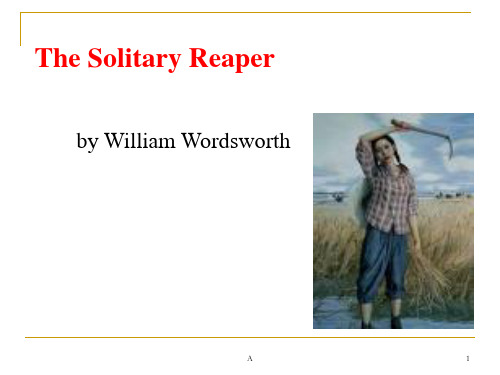
by William Wordsworth
A
1
Stanza 1: The poet heard a Scottish girl singing
while reaping in the wheat field.
vt. look at =yonder: overthere
看她,在田里独自一个,
那个苏格兰高原的少女!
独自在收割,独自在唱歌;
停住吧,或者悄悄走过去!
她独自割麦,又把它捆好,
唱着一只忧郁的曲调;
听啊!整个深邃的谷地
都有这一片歌声在洋溢
A
3
Stanza 2: The poet is surprised to hear such a
beautiful song in so remote a place.
夜莺a bird good at singing
=chant歌唱
1No Nightingale did ever chaunt 2More welcome notes to weary bands
可爱的 音符
3Of travellers in some shady haunt, 4Among Arabian sands
but knows it is about something sad.
sad
音符
Hale Waihona Puke 1Will no one tell me what she sings?
2Perhaps the plaintive numbers flow are about
3 For old, unhappy, far-off things, (Her song is
The Solitary Reaper赏析
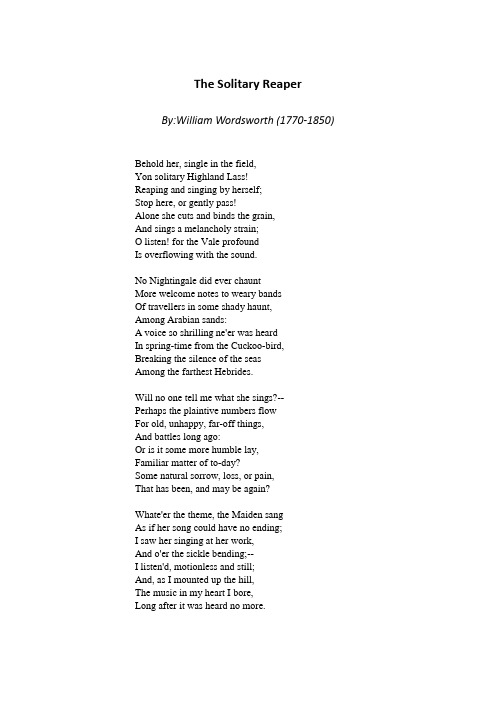
The Solitary ReaperBy:William Wordsworth (1770-1850) Behold her, single in the field,Yon solitary Highland Lass!Reaping and singing by herself;Stop here, or gently pass!Alone she cuts and binds the grain,And sings a melancholy strain;O listen! for the Vale profoundIs overflowing with the sound.No Nightingale did ever chauntMore welcome notes to weary bandsOf travellers in some shady haunt,Among Arabian sands:A voice so shrilling ne'er was heardIn spring-time from the Cuckoo-bird,Breaking the silence of the seasAmong the farthest Hebrides.Will no one tell me what she sings?--Perhaps the plaintive numbers flowFor old, unhappy, far-off things,And battles long ago:Or is it some more humble lay,Familiar matter of to-day?Some natural sorrow, loss, or pain,That has been, and may be again?Whate'er the theme, the Maiden sangAs if her song could have no ending;I saw her singing at her work,And o'er the sickle bending;--I listen'd, motionless and still;And, as I mounted up the hill,The music in my heart I bore,Long after it was heard no more.Notes1] Coleridge, Wordsworth, and his sister had visited the Scottish Highlands in 1803. Dorothy's Recollections for September 13 that year notes: "It was harvest time, and the fields were quietly -- might I be allowed to say pensively? -- enlivened by small companies of reapers. It is not uncommon in the more lonely parts of the Highlands to see a single person so employed." In a note to the 1807 edition, Wordsworth traced the poem's source: "This Poem was suggested by a beautiful sentence in a MS Tour in Scotland written by a Friend, the last line being taken from it verbatim." Thomas Wilkinson's manuscript, Tours to the British Mountains (London, 1824), states: "Passed a Female who was reaping alone: she sung in Erse as she bended over her sickle; the sweetest human voice I ever heard: her strains were tenderly melancholy, and felt delicious, long after they were heard no more" (12).2] Highland: mountainous region in northern Scotland associated with the Celtic clans.7] Vale profound: broad, deep valley between two high ranges; possibly the world itself, as a place of suffering (OED "vale" 2b). Wordsworth takes this from conventional poetic diction; cf. Gilbert West's "Education. A Poem" (1751), lines 617-21:On to the Centre of the Grove they stray'd;Which, in a spacious Circle opening round,Within it's shelt'ring Arms securely laid,Disclosed to sudden View a Vale profound,With Nature's artless Smiles and tranquil Beauties crown'd.9] Nightingale: a small song-bird, well-known for the male's musical notes in the mating and nesting season. In Classical myth, the female nightingale is that to which Philomela, tragically raped and mutilated by her sister Procne's husband, metamorphoses on carrying out her revenge.14] Cuckoo-bird: song-bird migrating to Britain in the spring and associated with renewal. Cf. John Logan's "Ode to the Cuckoo" (1782) and "Spring" by Thomas Brerewood (-1748):When the wood-pigeons sit on the branches and coo;And the cuckoo proclaims with his voice,That Nature marks this for the season to woo,And for all that can love to rejoice ...16] Hebrides: islands northwest of Scotland in the Atlantic.18] plaintive numbers: conventional poetic phrase, as in George Dyer's "Ode XIX. Toa Young Painter and Poetess" (1801):So may the foliage of thy springBe follow'd by the richest bloom;Nor thou in plaintive numbers singTo Genius, withering in the tomb.21] humble lay: conventional poetic diction, as in Thomas Warton's "ODE V. To a Gentleman upon his Travels thro' Italy" (1747), lines 1-3:While I with fond officious care,For you my chorded shell prepare,And not unmindful frame an humble lay ...Commentary by Ian Lancashire(2002/9/9)Wordsworth's preface to the 1800 Lyrical Ballads argues that poetry "contains a natural delineation of human passions, human characters, and human incidents." It ought not be judged by the presence of artificial, poetic diction. Rather, "the language of conversation in the middle and lower classes of society" can be its medium. "The Solitary Reaper" exemplifies these beliefs.Written seven years after Lyrical Ballads, it describes a nameless listener's delight in a young woman's melancholy song in an unknown language as, working by herself in a Scottish valley, she swings a sickle, reaping grain. Four eight-line stanzas, each closing with two couplets and all written in octosyllabic lines, have a musical lilt. Short lines deliver the rhymes at a quick pace. Sentences normally need two or more such short lines to complete, so that few lines are strongly end-stopped; most freely enjamb. Diction is conversational. Often lines consist mainly of monosyllabic words (4-5, 13, 17, 21, 24, 27, 30-32). Wordsworth prefers common verbs, "behold," "reap," "sing," "stop," "pass," "cut," "bind," "chant," "hear," and "break." Words imported into English from Latin or Greek, like "solitary" and "melancholy" or forms with "-ive" and "-ion" endings (e.g., "plaintive" and "motionless"), are infrequent. Wordsworth writes plain, almost undemanding verse. For example, he repeats the simplest idea in varying words. The girl is "single," "solitary," and "by herself" (1-3). She is "reaping" (3), that is, "cuts and binds the grain" (5), "o'er the sickle bending"(28). The onlooker is both "motionless and still" (29). The lass "sings" (3, 17, 25, 27) or does "chant" (9) a "strain" (6), a "lay" (21), or "a song" (26). The speaker relies on everyday idioms, worn to vagueness by overuse in ordinary talk. Her "theme" (25) is of "things" (19) or "matter" (22) "That has been, and may be again" (24). Thisexcludes only what never existed at all. Whenever the speaker might become elevated in speech, his language seems prosaic, even chatty: "Will no one tell me ..." (17), "Whate're the theme" (25), and "Long after it was heard no more" (32). Wordsworth notes, pointedly, that this last line comes verbatim from a prose travel book."The Solitary Reaper" does not implement, programmatically, his dogma of plain diction. For example, "Vale profound" (7), "plaintive numbers" (18), and "humble lay" (21) are semi-formulaic catch phrases in the very eighteenth-century verse whose artificiality he rejects. These exceptions may be deliberate, characterizing the speaker (not Wordsworth) as someone for whom poetry means much. He resorts to formulas as if to hint that the girl's song is out-of-place in the valley, however separated from the traditions of fine verse by her class, occupation, and location. Wordsworth may deliberately impoverish his speaker's language so as to contrast it with the reaper's song.Unlike other poets, this lass sings alone, isolated from both her predecessors (her "poetic tradition") and any audience. Dryden, Pope, Gray, and so many others defined themselves by quoting from classical literature and each other. Wordsworth's "The Solitary Reaper" shatters this continuity. Her song, like a found poem, springs directly from nature, without literary context. Her "music" runs like water ("overflowing" the valley) and surpasses the beauty of two celebrated English song-birds, the nightingale and the cuckoo. Here again the speaker raids conventional poetic language, as if incapable of finding truly suitable language. Ironically, both his analogies break down. Reaping takes place at harvest time, in the autumn, not in the spring or summer, seasons traditionally associated with the cuckoo and the nightingale. The reaper, a single "Maiden" (25), hardly fits the myth of married Philomela, rape victim and tragic revenger, even though the reaper sings in a melancholic, plaintive way about "Some natural sorrow" (23). The strange language in which the lass chants also removes her from any poetic tradition known to the speaker. He comprehends only her "sound," "voice," and "music," though it rings in his heart -- his memory -- "long after it was heard no more" (32).This simple confession redeems the speaker from his own impoverished language. He bears witness to something that eighteenth-century poetry seemed at times embarrassed of. What transfixes him in song is not its content, but its emotionally expressive music. The listener does not understand why she sings in melancholy, only what the emotion itself is. This feeling "could have no ending" (26), as if she, like Keats' Ruth amid the alien corn, communicates wordlessly something universal about the human condition. Despite its sadness, the song helps the speaker to mount up the hill (30). In current psychology, the capacity to feel emotion and link it to goals makes life, indeed survival itself, possible. The speaker's "heart" (31), by bearing her music, can go on. For that reason, "The Solitary Reaper" relates an ecstatic moment in which a passer-by transcends the limitations of mortality. Both the song and he go on together.Bibliography•Finch, Geoffrey J. "Wordsworth's Solitary Song: The Substance of 'true art' in 'The Solitary Reaper'." Ariel 6.3 (1975): 91-100. PR/1/A75•Howard, William. "'Obstinate questionings': The Reciprocity of Speaker and Auditor in Wordsworth's Poetry." Philological Quarterly 67.2 (Spring 1988): 219-39.•James, G. Ingli, and Pittock, Malcolm. "Wordsworth's 'The Solitary Reaper'."Essays in Criticism 15 (1965: 65-76. PN/2/E77•Jones, Nancy A. "The Rape of the Rural Muse: Wordsworth's 'The Solitary Reaper' as a Version of Pastourelle." In Higgins, Lynn A., and Silver, BrendaR., eds. Rape and Representation (New York: Columbia University Press,1991): 263-77. PN 56 .R24R37 1991•McSweeney, Kerry. "Performing 'The Solitary Reaper' and 'Tears, Idle Tears.'" Criticism: A Quarterly for Literature and the Arts 38:2 (Spring 1996): 281-302.•Preston, John. "'The Moral Properties and Scope of Things': The Structure of The Solitary Reaper." Essays in Criticism 19 (1969): 60-66.。
肖申克的救赎-作品赏析ppt课件

主要人物
罗伯特·艾伦科特,因为企图抢银行结果打死了很多人所以被关进肖申克监狱,他在监狱里有个小嗜好就是喜欢收藏钱币,别人都不相信在监狱里收藏这些东西会不被发现,可是直到他死后,都没有人看到过那些被他收藏的钱币的踪影。
罗伯特·艾伦科特
主要人物
肯德里克斯,此人在监狱里还算是个模范犯人,但是他缺钱,向瑞德借了不少,后来还不起只能靠向瑞德提供了四年的情报才算两清。情报对于瑞德非常重要,因为他在监狱里干的还是违法的事,如果没有确切的消息,在监狱里很难混的下去。肯德里克斯还能提供一些别人根本无法看到的档案和纪录,而瑞德关于安迪的一些信息都是从肯德里克斯处来的。
作品鉴赏
1.不要忘了,这个世界穿透一切高墙的东西,它就在我们的内心深处,他们无法达到,也接触不到,那就是希望。 2. Fear can hold you prisoner,hope can set you free. 怯懦囚禁灵魂,希望还你自由. 3. Hope is a good thing, maybe the best of things, and no good thing ever dies. 希望是美好的,也许是人间至善,而美好的事物. 作品简介
02. 作品鉴赏
作品简介
01
基本信息
作品名:肖申克的救赎 原名:Rita Heyworth and Shawshank Redemption 作者:斯蒂芬·金 体裁:中篇小说 《肖申克的救赎》是美国作家斯蒂芬·金的 中篇小说,也是其代表作。收录于小说合集 《四季奇谭》中,副标题为“春天的希望”。
主要人物
小说中,安迪似乎是负有某种使命降临到肖申克监狱中的福音使者,他的到来是笼罩在蓝灰色监狱中的一缕阳光,但就是这缕阳光,给肖申克监狱的狱友们带来了光明;他的到来使处于沮丧、绝望、麻木状态的狱友们重燃了生活的希望,让他们在忙着活和忙着死的抉择中做出了正确的选择。
The Solitary Reaper

The Solitary孤独Reaper割麦者by William Wordsworth1-----------------------------------Be hold看her, sin gle in the field,Yon那边solitary Highland Lass!Reaping and singing by herself;Stop here, or gently pass!Alone she cuts and binds捆the grain,And sings a melancholy strain忧伤的曲调;O listen! for the Vale山谷profoundIs overflowing with the sound.2-----------------------------------No Nightingale did ever chaunt=chant唱More welcome可爱notes to weary bands成群的Of travellers in some shady haunt常去之地, Among Arabian sands阿拉伯沙漠:A voice so thrilling动人ne'er was heardIn spring-time from the Cuckoo-bird杜鹃鸟, Breaking the silence of the seasAmong the farthest Hebrides赫布里底群岛.3-----------------------------------Will no one tell me what she sings?—Perhaps the plaintive 忧郁numbers flow For old, unhappy, far-off things,And battles long ago:Or is it some more humble lay小调, Familiar matter of to-day?Some natural sorrow, loss, or pain,That has been, and may be again?4-----------------------------------Whate'er the theme, the Maiden姑娘sang As if her song could have no ending;I saw her singing at her work,And o'er the sickle镰刀bending;—I listen'd, motionless and still;And, as I mounted up the hill,The music in my heart I bore携带,Long after it was heard no more.。
戏剧分析
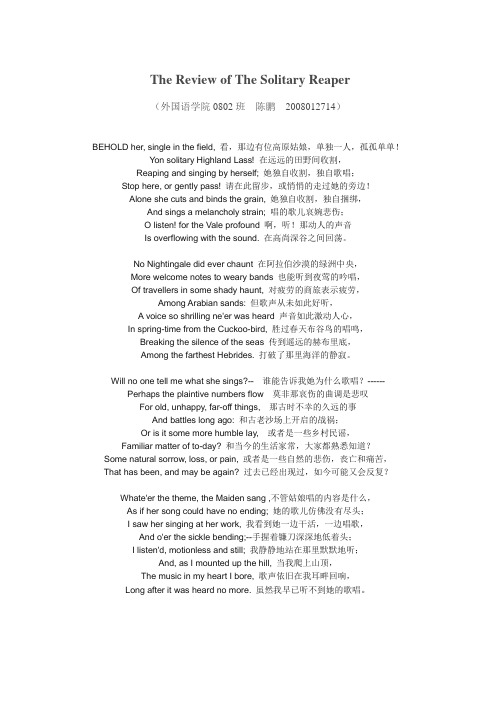
The Review of The Solitary Reaper(外国语学院0802班陈鹏2008012714)BEHOLD her, single in the field, 看,那边有位高原姑娘,单独一人,孤孤单单!Yon solitary Highland Lass! 在远远的田野间收割,Reaping and singing by herself; 她独自收割,独自歌唱;Stop here, or gently pass! 请在此留步,或悄悄的走过她的旁边!Alone she cuts and binds the grain, 她独自收割,独自捆绑,And sings a melancholy strain; 唱的歌儿哀婉悲伤;O listen! for the Vale profound 啊,听!那动人的声音Is overflowing with the sound. 在高尚深谷之间回荡。
No Nightingale did ever chaunt 在阿拉伯沙漠的绿洲中央,More welcome notes to weary bands 也能听到夜莺的吟唱,Of travellers in some shady haunt, 对疲劳的商旅表示疲劳,Among Arabian sands: 但歌声从未如此好听,A voice so shrilling ne'er was heard 声音如此激动人心,In spring-time from the Cuckoo-bird, 胜过春天布谷鸟的唱鸣,Breaking the silence of the seas 传到遥远的赫布里底,Among the farthest Hebrides. 打破了那里海洋的静寂。
Will no one tell me what she sings?-- 谁能告诉我她为什么歌唱?------ Perhaps the plaintive numbers flow 莫非那哀伤的曲调是悲叹For old, unhappy, far-off things, 那古时不幸的久远的事And battles long ago: 和古老沙场上开启的战祸;Or is it some more humble lay, 或者是一些乡村民谣,Familiar matter of to-day? 和当今的生活家常,大家都熟悉知道?Some natural sorrow, loss, or pain, 或者是一些自然的悲伤,丧亡和痛苦,That has been, and may be again? 过去已经出现过,如今可能又会反复?Whate'er the theme, the Maiden sang ,不管姑娘唱的内容是什么,As if her song could have no ending; 她的歌儿仿佛没有尽头;I saw her singing at her work, 我看到她一边干活,一边唱歌,And o'er the sickle bending;--手握着镰刀深深地低着头;I listen'd, motionless and still; 我静静地站在那里默默地听;And, as I mounted up the hill, 当我爬上山顶,The music in my heart I bore, 歌声依旧在我耳畔回响,Long after it was heard no more. 虽然我早已听不到她的歌唱。
thesolitaryreaper(孤独的割麦女)

the solitary reaper(孤独的割麦女)前几天读到华兹华斯的孤独的收割者,觉得诗歌本身提供的几个意象还是很经典的,但是因为语言的原因,实际上并没有很大的表现力。
至少我是这么想的,虽然这首诗成为了经典但是我很怀疑它的经典性。
我的想法是,英文诗歌普遍不如中文诗歌。
这是有多方面原因的,其中很重要的一点是两种语言特点不同。
中文是单音节方块字,而英文则是音节不规则的拼音文字,所以在表达韵律上面,中文更显得从容不迫,而英文除了要考虑它的音节和音步数量以及音节的扬抑情况外,还有各种不同的压韵方式(韵律),这些是很让人头疼的东西而即使这些都做到工整,单词本身的长短和。
读音的长短,仍然会影响到诗歌在纸面上的”建筑美”和在口头诵读上的音韵美。
我们比较容易听得出中文诗歌的韵律和节奏(即使在现代自由诗歌中都有很鲜明的节奏韵律),但是英文诗歌的韵律和节奏却特别弱化。
尽管有一大堆的讲究,比如光是按基本的位置就有头韵\内韵和尾韵之分,而单单尾韵就有那么多的讲究,只是十四行诗一种就有三种基本尾韵结构甚至更多-但是我们在听读诗歌的时候还是很难说出它究竟在音韵上有哪一点吸引人的。
这个就得归结到语言本身上去。
另一个是文化的差异性。
中国古代的诗歌我认为是最有诗意的,而且宋词好于唐诗。
这里面的关键在于中国文化中写意的传统。
其实不单单是诗歌,在很多其它艺术表现形式,比如绘画中,都能够看得出来。
中国的国画同诗歌一致,讲求意境,而且大概是”意在画外”的。
这里的意境主要的还是审美的范畴,其次就是个人的情绪情感渲染,正是这两点构成了中国艺术的诗意特性。
与此不同的,包括英美在内的整个西方世界的诗歌同它的绘画一样,是技术性和哲学性大于它的情绪情感和艺术性的。
西方的诗歌更注重的是技术上的运用,特别是在语言架构上的努力。
因为前面说过西方语言的音韵很难表现美感,而要注重它表面的音韵节奏,就不得不忽略掉它内在的审美特征,许多词汇都丝毫无诗意可言,而给人感觉只是在凑字。
The solitary reaper 详细赏析
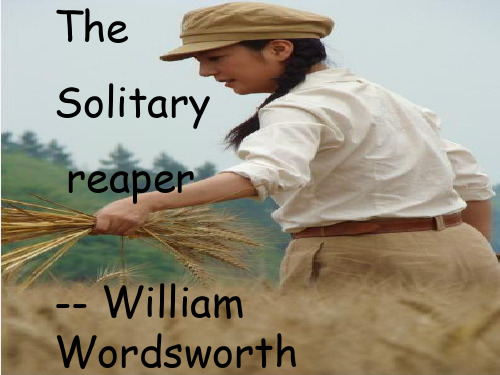
Behold her, single in the field, Yon solitary Highland Lass! Reaping and singing by herself; Stop here, or gently pass! Alone she cuts and binds the grain And sings a melancholy strain; Oh listen! For the vale profound Is overflowing with the sound. 看她,在田里独自一个, 那个苏格兰高原的少女! 独自在收割,独自在唱歌; 停住吧,或者悄悄走过去! 她独自割麦,又把它捆好, 唱着一只忧郁的曲调; 听啊!整个深邃的谷地 都有这一片歌声在洋溢
华兹华斯长期住在乡村、湖畔,其诗作以描写自然风光、田园景色、 华兹华斯长期住在乡村、湖畔,其诗作以描写自然风光、田园景色、乡 民村姑、少男少女闻名于世。他重视想象力, 民村姑、少男少女闻名于世。他重视想象力,善于把平凡的日常生活勾 勒得富于奇妙的色彩, 勒得富于奇妙的色彩,“使日常的东西在不平常的状态下呈现在心灵面 强调”一切好诗都是强烈情感的自然流露“ 前”强调”一切好诗都是强烈情感的自然流露“他注意吸取民间诗歌的 艺术特色,采用民间生动、淳朴的口语。这使他的诗独辟蹊径, 艺术特色,采用民间生动、淳朴的口语。这使他的诗独辟蹊径,呈现出 朴素清新、天然成趣的境界,一反新古典主义平板、典雅的风格, 朴素清新、天然成趣的境界,一反新古典主义平板、典雅的风格,开创 了新鲜活泼的浪漫主义诗风。人们称他为“自然诗人” 了新鲜活泼的浪漫主义诗风。人们称他为“自然诗人”。他的诗在描写 自然风光、平民事物之中,常寓有深意, 自然风光、平民事物之中,常寓有深意,寄托着自我反观和对人生的哲 学思考。 学思考。
The Solitary Reaper(孤独的割麦女)--William Wordsworth
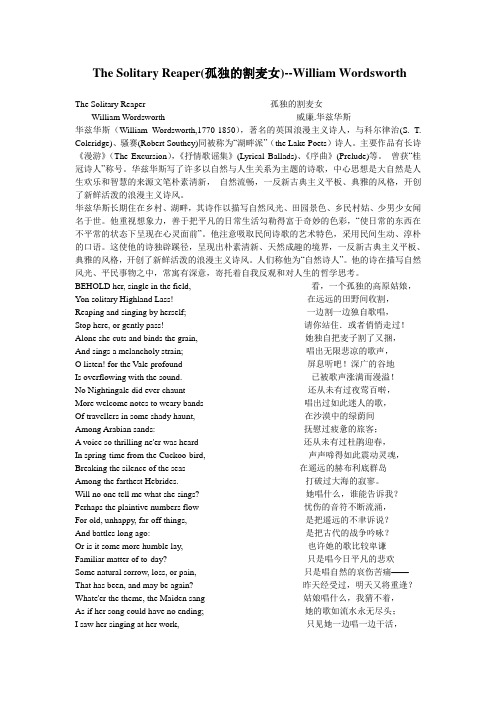
The Solitary Reaper(孤独的割麦女)--William WordsworthThe Solitary Reaper 孤独的割麦女--William Wordsworth 威廉.华兹华斯华兹华斯(William Wordsworth,1770-1850),著名的英国浪漫主义诗人,与科尔律治(S. T. Coleridge)、骚赛(Robert Southey)同被称为“湖畔派”(the Lake Poets)诗人。
主要作品有长诗《漫游》(The Excursion),《抒情歌谣集》(Lyrical Ballads)、《序曲》(Prelude)等。
曾获“桂冠诗人”称号。
华兹华斯写了许多以自然与人生关系为主题的诗歌,中心思想是大自然是人生欢乐和智慧的来源文笔朴素清新,自然流畅,一反新古典主义平板、典雅的风格,开创了新鲜活泼的浪漫主义诗风。
华兹华斯长期住在乡村、湖畔,其诗作以描写自然风光、田园景色、乡民村姑、少男少女闻名于世。
他重视想象力,善于把平凡的日常生活勾勒得富于奇妙的色彩,“使日常的东西在不平常的状态下呈现在心灵面前”。
他注意吸取民间诗歌的艺术特色,采用民间生动、淳朴的口语。
这使他的诗独辟蹊径,呈现出朴素清新、天然成趣的境界,一反新古典主义平板、典雅的风格,开创了新鲜活泼的浪漫主义诗风。
人们称他为“自然诗人”。
他的诗在描写自然风光、平民事物之中,常寓有深意,寄托着自我反观和对人生的哲学思考。
BEHOLD her, single in the field, 看,一个孤独的高原姑娘,Yon solitary Highland Lass! 在远远的田野间收割,Reaping and singing by herself; 一边割一边独自歌唱,Stop here, or gently pass! 请你站住.或者俏悄走过!Alone she cuts and binds the grain, 她独自把麦子割了又捆,And sings a melancholy strain; 唱出无限悲凉的歌声,O listen! for the Vale profound 屏息听吧!深广的谷地Is overflowing with the sound. 已被歌声涨满而漫溢!No Nightingale did ever chaunt 还从未有过夜莺百啭,More welcome notes to weary bands 唱出过如此迷人的歌,Of travellers in some shady haunt, 在沙漠中的绿荫间Among Arabian sands: 抚慰过疲惫的旅客;A voice so thrilling ne'er was heard 还从未有过杜鹃迎春,In spring-time from the Cuckoo-bird, 声声啼得如此震动灵魂,Breaking the silence of the seas 在遥远的赫布利底群岛Among the farthest Hebrides. 打破过大海的寂寥。
英国文学 The solitary reaper

EDFICATION
Themes of Wordsworth’s poems 1.natural impressions 2.the feelings of the common people 3.harmony between humanity and nature
• 从这些诗歌中我们都能体验到不管是“爱”,“自 然”还是代表艺术的“歌声”等,我们都能找到 healing effect。今天我们总是抱怨是生活的“郁闷” 的年代,我们可不可以从这些诗歌告诉我们的源泉 中来寻找自我的精神的慰藉和前行的力量呢?
Will no one tell me what she sings? Perhaps the plaintive numbers (sad melody)flow For old, unhappy, far-off(long time ago) things, And battles long ago: Or is it some more humble lay, Familiar matter of to-day? Some natural sorrow, loss, or pain, That has been, and may be again? (such as the natural death of her parents )
释义:
不管她唱的是什么题目, 她的歌好像会没完没了, 我看见她边唱边干活, 弯着腰,挥动她的镰刀—— 我一动也不动,听了许久; 后来,当我上山的时候, 我把歌声还记在心上, 虽然早已听不见声响
• Genre: lyric poem 抒情诗 • Structure: four 8-line stanzas 共四节,每节八句 • Rhyme Scheme: ababccdd (except lines 1 & 3 in stanzas 1 and 4) • Meters: iambic tetrameter 四音步抑扬格
The_solitary_reaper_详细赏析
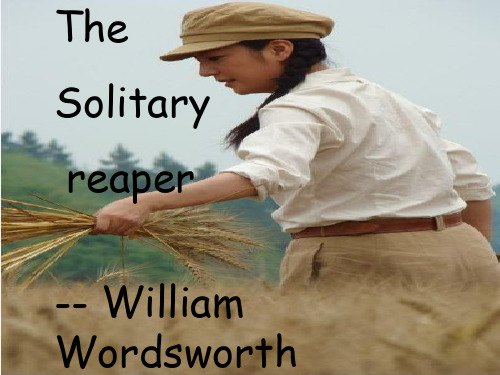
Stanza 1: The poet heard a Scottish girl singing while reaping in the wheat field. 苏格兰西
vt. look
at
=yonder:
overthere
北部高原
1Behold
her, single in the field, =girl The poet 2Yon solitary Highland Lass! 3Reaping and singing by herself; hesitates.or恐惊 4Stop here, or gently pass! 捆 5Alone she cuts and binds the grain, 哀伤的曲调 6And sings a melancholy strain; =valley 7O listen! for the Vale profound 8Is overflowing with the sound. Her voice is like water.
Behold her, single in the field, Yon solitary Highland Lass! Reaping and singing by herself; Stop here, or gently pass! Alone she cuts and binds the grain And sings a melancholy strain; Oh listen! For the vale profound Is overflowing with the sound. 看她,在田里独自一个, 那个苏格兰高原的少女! 独自在收割,独自在唱歌; 停住吧,或者悄悄走过去! 她独自割麦,又把它捆好, 唱着一只忧郁的曲调; 听啊!整个深邃的谷地 都有这一片歌声在洋溢
- 1、下载文档前请自行甄别文档内容的完整性,平台不提供额外的编辑、内容补充、找答案等附加服务。
- 2、"仅部分预览"的文档,不可在线预览部分如存在完整性等问题,可反馈申请退款(可完整预览的文档不适用该条件!)。
- 3、如文档侵犯您的权益,请联系客服反馈,我们会尽快为您处理(人工客服工作时间:9:00-18:30)。
Stanza 1: The poet heard a Scottish girl singing
while reaping in the wheat field.
vt. look at =yonder: overthere
苏格兰西 北部高原
1Behold her, single in the field,
Wordsworth 威廉.华兹华斯 华兹华斯(William Wordsworth,1770-1850),著名的英国浪漫主义 诗人,与科尔律治(S. T. Coleridge)、骚赛(Robert Southey)同被称为 “湖畔派”(the Lake Poets)诗人。主要作品有长诗《漫游》(The Excursion),《抒情歌谣集》(Lyrical Ballads)、《序曲》(Prelude)等。 曾获“桂冠诗人”称号。华兹华斯写了许多以自然与人生关系为主题的诗 歌,中心思想是大自然是人生欢乐和智慧的来源文笔朴素清新, 自然流 畅,一反新古典主义平板、典雅的风格,开创了新鲜活泼的浪漫主义诗风。
V. Themes of Wordsworth’s poems 1.natural impressions
2.the feelings of the common people 3.harmony between humanity and nature
• 写作背景
• 华兹华斯生于Байду номын сангаас格兰西北部湖区一律师家庭,八岁时离家求 学,爱好大自然和诗歌。1787年进剑桥大学。1790年暑期徒 步游历法国、瑞士、意大利。1791年毕业后徒步漫游了威尔 士。他曾多次到苏格兰各地游历,广泛接触大自然和乡村风 土民情。这首诗据说就是他游历时的收获;另一种说法认为 是诗人读了朋友哈金森的一则日记后写的。哈金森在日记中 写道,在一次远足中,他偶然看到一位苏格兰高地农家女在 麦田里一面劳作,一面唱歌。歌声悠扬哀婉,凄切动人。这 些材料经过诗人点化,成了这首脍炙人口的抒情诗。
group oasis绿洲
deserts in most
of the Arabian Peninsula 半岛
where travellers take a rest under the
nightingale
trees.
动人的
=never
herald 信使of
spring, coming
5A voice so thrilling ne'er was heard in April and
看她,在田里独自一个, 那个苏格兰高原的少女! 独自在收割,独自在唱歌; 停住吧,或者悄悄走过去! 她独自割麦,又把它捆好, 唱着一只忧郁的曲调; 听啊!整个深邃的谷地 都有这一片歌声在洋溢
Stanza 2: The poet is surprised to hear such a
beautiful song in so remote a place.
The Solitary reaper
-- William Wordsworth
The Solitary Reaper
by William Wordsworth
Wordsworth (1770-1850) was
the 3rd greatest poet in English
literature after Shakespeare and
wordsworth
Milton, poet
laureate(桂冠诗人), leader
of the English Romantic
Movement and the most famous
of the Lake poets湖畔诗人. His
best poems are short lyrics抒情诗.
2Yon solitary Highland Lass!
=girl
The poet
3Reaping and singing by herself; hesitates.or恐惊
4Stop here, or gently pass!
捆
5Alone she cuts and binds the grain, 哀伤的曲调 6And sings a melancholy strain;
华兹华斯长期住在乡村、湖畔,其诗作以描写自然风光、田园景色、乡 民村姑、少男少女闻名于世。他重视想象力,善于把平凡的日常生活勾 勒得富于奇妙的色彩,“使日常的东西在不平常的状态下呈现在心灵面 前”强调”一切好诗都是强烈情感的自然流露“他注意吸取民间诗歌的 艺术特色,采用民间生动、淳朴的口语。这使他的诗独辟蹊径,呈现出 朴素清新、天然成趣的境界,一反新古典主义平板、典雅的风格,开创 了新鲜活泼的浪漫主义诗风。人们称他为“自然诗人”。他的诗在描写 自然风光、平民事物之中,常寓有深意,寄托着自我反观和对人生的哲 学思考。
6In spring-time from the Cuckoo-bird, leaving in
7O listen! for the Vale profound
=valley
8Is overflowing with the sound. Her voice is like water.
Behold her, single in the field, Yon solitary Highland Lass! Reaping and singing by herself; Stop here, or gently pass! Alone she cuts and binds the grain And sings a melancholy strain; Oh listen! For the vale profound Is overflowing with the sound.
夜莺a bird good at singing
=chant歌唱
1No Nightingale did ever chaunt 2More welcome notes to weary bands
可爱的 音符
3Of travellers in some shady haunt, 4Among Arabian sands
